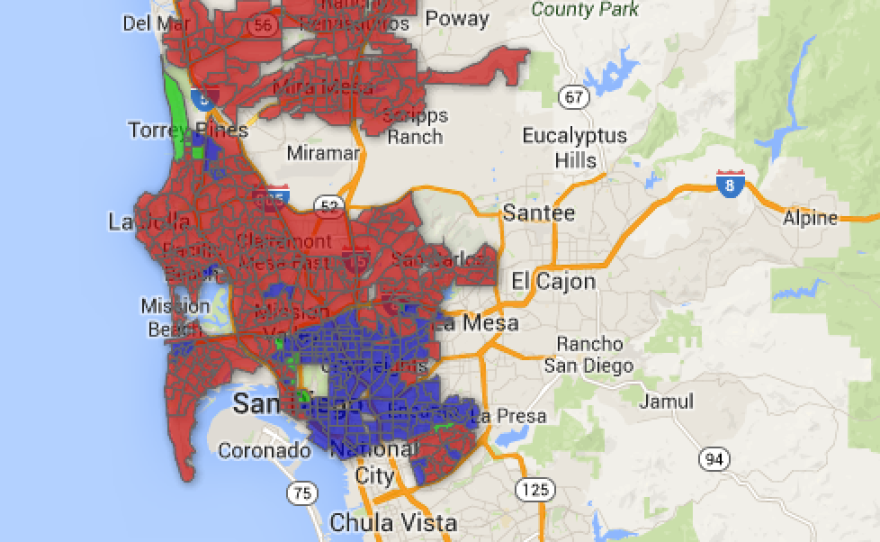While the vote for second place in San Diego’s special mayoral election appeared to be a tight race last night, an inewsource analysis shows former assemblyman Nathan Fletcher lost in almost every precinct.
With 581 precincts counted, Fletcher won in just 14. He even lost his own University City neighborhood precinct.
See How The 581 Precincts Voted
“To me that was his ideal supporter: Caucasian, Democratic household, probably north of (Interstate) 8, higher median income. People like him,” said policy analyst Vince Vasquez
While Fletcher had broad support with 24 percent of the vote, it wasn’t deep enough to win over entire neighborhoods, said Vasquez, a senior policy analyst at National University System Institute for Policy Research.
Republican city councilman Kevin Faulconer won the greatest number of precincts, 387, almost all of them north of Interstate 8. Democratic city councilman David Alvarez won 180, almost all of them south of the 8.
The interstate has long been perceived as a political and socio-economic dividing line between Republicans and Democrats, the rich and the poor.
“You see that deep geographic divide among voters. It’s something not going away. If anything its more pronounced,” Vasquez said.
That polarization posed a problem for Fletcher, a Republican, turned Independent, turned Democrat. He did not get the Democratic Party endorsement nor the San Diego and Imperial Valley Labor Council Endorsement.
Voters often take their cues from political parties and other lobby groups, Vasquez said.
Fletcher was hit by attack ads from both Republicans and Democrats throughout the campaign for switching parties and missing votes while serving in the California Assembly. Even his college transcript, which he refused to release, became a Republican talking point throughout the campaign.
Fletcher conceded the race Wednesday and threw his support behind fellow Democrat Alvarez.
“We worked tremendously hard and we came really close. And I 100 percent respect the decision voters made,” Fletcher said.
“Today I leave public life. I leave the pursuit of elected office,” he said.
Just over 200,000 San Diegans voted in Tuesday’s special election, called after former mayor Bob Filner resigned over a sexual harassment scandal. Registrar of Voters Michael Vu said the turnout was about 32 percent. Although 100 percent of the precincts have been reported, there are still about 34,500 provisional and mail ballots left to count.
An inewsource analysis also shows Fletcher’s victories in precincts were narrow compared to the other candidates. In precincts he lost, he lost by less than the other candidates.
Fletcher’s average share of the vote in precincts he lost was nearly 24 percent, compared with Faulconer about 22 percent and Alvarez 20 percent
In precincts he won, he won by a less than the other candidates did. Faulconer’s average vote share in precincts he won: 49 percent, Alvarez’ share was 48 percent and Fletcher’s average vote share in precincts he won was 40 percent.
The trend demonstrates Fletcher’s broad but shallow support, but in this election being in the middle meant losing the race.





